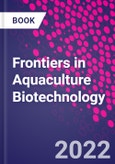Frontiers in Aquaculture Biotechnology presents a broad-spectrum of topics, covering different key aspects of aquaculture. With the rising importance of aquaculture research, evidence-based information is integral in advancing this field. This book provides a solid resource of information on DNA barcoding for fish species authentication and seafood labelling and cell culture, including stem cell culture, in vitro research using fish cell lines such as in vitro fish meat, reproductive biotechnology, including surrogate technology, gene editing and genetically modified aquaculture species, biofloc technology, and omic technologies such as proteomics, artificial intelligence and biobanking.
This book will be a valuable resource to students, researchers a nd entrepreneurs interested in a better understanding of this emerging field of aquaculture.
Please Note: This is an On Demand product, delivery may take up to 11 working days after payment has been received.
Table of Contents
1. Molecular markers for species/seed/hybrid authentication2. New synthetic peptides and hormones and analogues for induced breeding
3. Biofloc Technology
4. DNA-Barcoding as biotechnological tool for species authentication and seafood labelling
5. Development of fish cell lines (methods)
6. Characterization of fish cell lines (methods)
7. Applications of fish cell lines for in vitro research /in vitro fish meat production
8. Stem cell culture
9. Tissue engineering
10. Neutraceuticals and nutrigenomics
11. Biotechnological tool for fish health management/antimicrobial resistance
12. Fish drugs / vaccine/biofilm
13. Genome editing in aquaculture species
14. Genetically modified aquaculture species
15. NGS/ Whole Genome Sequencing
16. Fish Proteomics and metabolomics
17. Reproductive Biotechnology/Surrogate Technology
18. Biobank and cell Line repositories
19. Biosafety regulations/Ethical/Welfare and IPR Issues/Environmental Issues
20. Challenges and opportunities








